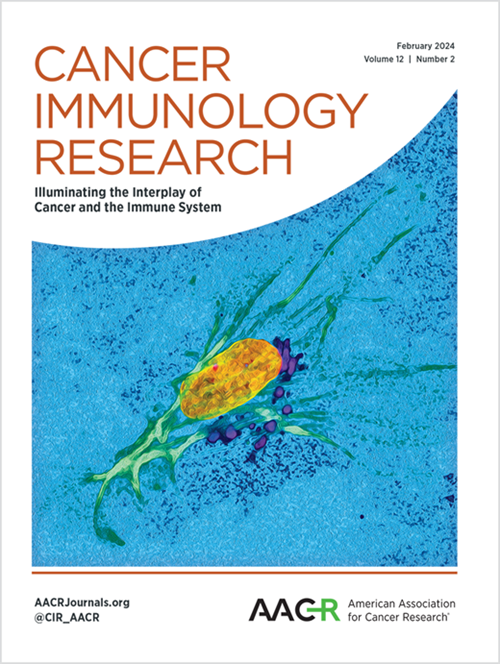Melanoma clonal heterogeneity leads to secondary resistance after adoptive cell therapy with tumor-infiltrating lymphocytes
IF 8.1
1区 医学
Q1 IMMUNOLOGY
引用次数: 0
Abstract
Adoptive cell therapy (ACT) with tumor-infiltrating lymphocytes (TIL) is effective in melanoma patients, although long-term responses seem restricted to patients who have complete remissions. Many patients develop secondary resistance to TIL-ACT but the involved mechanisms are unclear. Here, we describe a case of secondary resistance to TIL-ACT likely due to intratumoral heterogeneity and selection of a resistant tumor cell clone by the transferred T cells. To our knowledge, this is the first case of clonal selection of a pre-existing non-dominant tumor cell clone and it demonstrates a mechanism involved in secondary resistance to TIL-ACT that could potentially change current clinical practice, because it advocates for T-cell collection from multiple tumor sites and analysis of tumor heterogeneity before the treatment with TIL-ACT.黑色素瘤克隆异质性导致肿瘤浸润淋巴细胞采用细胞疗法后的继发性耐药性
使用肿瘤浸润淋巴细胞(TIL)的适应性细胞疗法(ACT)对黑色素瘤患者有效,但长期反应似乎仅限于完全缓解的患者。许多患者会对TIL-ACT产生继发性耐药性,但其中的机制尚不清楚。在这里,我们描述了一例对 TIL-ACT 产生继发性耐药的病例,其原因可能是瘤内异质性和转移的 T 细胞选择了耐药的肿瘤细胞克隆。据我们所知,这是第一例对已存在的非优势肿瘤细胞克隆进行克隆选择的病例,它展示了TIL-ACT继发性耐药的机制,有可能改变目前的临床实践,因为它提倡在使用TIL-ACT治疗前从多个肿瘤部位收集T细胞并分析肿瘤的异质性。
本文章由计算机程序翻译,如有差异,请以英文原文为准。
求助全文
约1分钟内获得全文
求助全文
来源期刊

Cancer immunology research
ONCOLOGY-IMMUNOLOGY
CiteScore
15.60
自引率
1.00%
发文量
260
期刊介绍:
Cancer Immunology Research publishes exceptional original articles showcasing significant breakthroughs across the spectrum of cancer immunology. From fundamental inquiries into host-tumor interactions to developmental therapeutics, early translational studies, and comprehensive analyses of late-stage clinical trials, the journal provides a comprehensive view of the discipline. In addition to original research, the journal features reviews and opinion pieces of broad significance, fostering cross-disciplinary collaboration within the cancer research community. Serving as a premier resource for immunology knowledge in cancer research, the journal drives deeper insights into the host-tumor relationship, potent cancer treatments, and enhanced clinical outcomes.
Key areas of interest include endogenous antitumor immunity, tumor-promoting inflammation, cancer antigens, vaccines, antibodies, cellular therapy, cytokines, immune regulation, immune suppression, immunomodulatory effects of cancer treatment, emerging technologies, and insightful clinical investigations with immunological implications.
 求助内容:
求助内容: 应助结果提醒方式:
应助结果提醒方式:


